We at Barn Finds thoroughly enjoy finding old, obscure automobiles and telling you about them, and this Bristol is a perfect example. It’s currently up for sale here on craigslist near Encino, California, and its rarity warrants a closer look. Come with us now, as we thank our loyal reader Roger for the tip and figure out what this thing is!
We have featured a handful of Bristols on Barn Finds, but never a 409, so please allow me to give you a brief history overview: Bristol Cars traces its roots all the way back to 1875, when Bristol Tramways was formed to provide Bristol, England with a public transport system. Fast-forward a few years to just after the First World War, when The Armistice was signed in 1918. Bristol had created Bristol Aeroplane Company and had contributed much to the war effort, but their services were no longer required. They retooled and built bodies for other British companies, including sibling company Bristol Tramways, until WWII broke out. During that war, they produced some legendary aircraft, however the bigwigs were determined not to make the same post-war mistake twice, so they got serious about the car business. Leadership met with Frazer-Nash’s European arm, who had a business arrangement with BMW before the war. BMW just happened to have left their blueprints lying around, for some reason, so one thing led to another, and we got the first hand-built Bristol vehicles from the Filton Aerodrome factory in 1947.
Fast-forward to today: Bristol has made a total of only about 3000 production cars in its entire history, some of which were sold new in America, but they’ve been mostly European and mostly dormant since the last Fighter rolled off the line in 2011. They did make a new vehicle for the 70th anniversary in 2016, the “Bullet“, of which 70 were to be built, and there’s talk of some sort of hybrid, but that’s a whole other can of beans. Their current headquarters is a small storefront on the Kensington High Street in Kensington section of London, England, and they allegedly will do restorations on customer vehicles.
So, on to the vehicle before us. We’re told that it’s a 1968, but in my research, I found some conflicting information as to the last year of 409 production, so this car could be a ’65, ’66, or maybe even a ’67. I did find for sure that all of the 409s were powered by Chrysler engines and transmissions, under aluminum bodies, over steel frames, and they have lift-up access panels in the lower section of the front fenders, which hold the spare wheel, battery, and some other functional bits. With all that, they also have some then-new safety enhancements akin to Mercedes-Benz of the day, like crumple zones, aerodynamic styling, and four-wheel disc brakes, to name only a few. The seller tells us that this one retains its original Chrysler 318 V8 and, most likely, Torqueflite automatic gearbox. We’re also that it’s been in storage since the 1980s and nearly all of the parts are there. That’s good, because it’s likely only one of only 74 ever made – which as we know makes replacement parts problematic. We can see in the pictures a rather unique car that needs restoration inside and out, but it looks salvageable nonetheless.
Researching obscure vehicles like this one is always fascinating to me, as I get to not only learn something but also get to share it with other enthusiasts like you. I found a lot more information than I expected or can fit in one article, so please forgive me if I missed anything. I guess the long-story-short or TL;DR is that this very rare piece of Automotive history seems quite fixable and probably worth every penny of its asking price. The only question left is whether or not YOU would want one of these in your “collection” Let us know your thoughts!
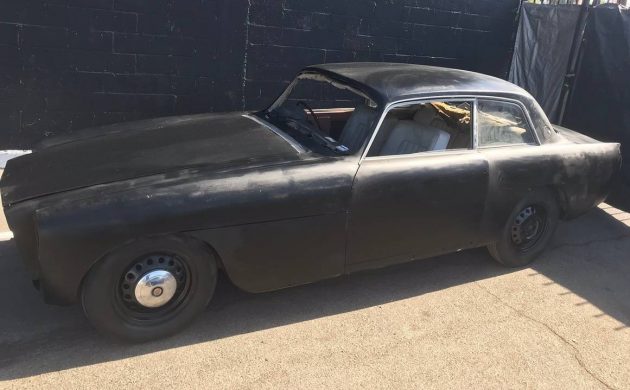
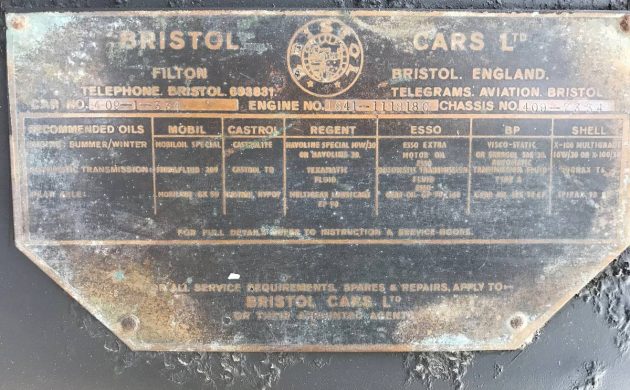
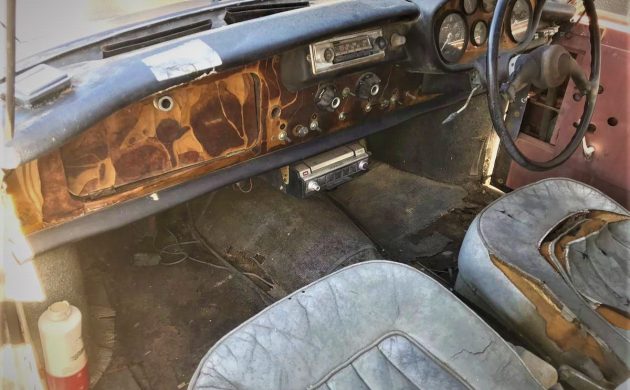
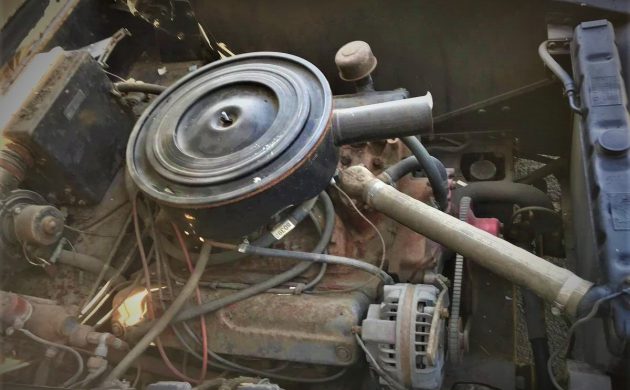
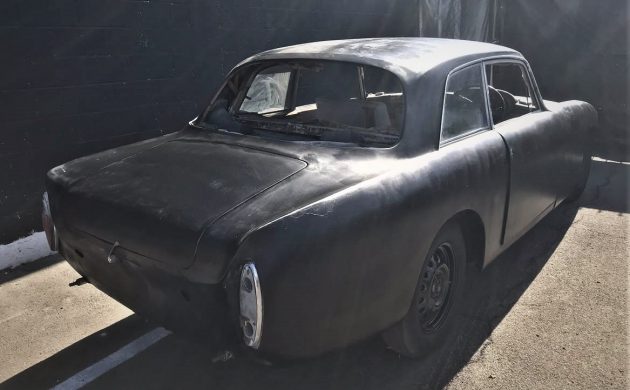






I like it….
One thing is certain, you’ll get British
coachwork with American reliability. If
this car used a British made engine and
tranny, it wouldn’t run for long as the Brits
couldn’t build a reliable car if their lives
depended on it. Leaky carbs, fault filled
electrical systems, and cloth wrapped wiring were just some of the hazards
you faced if you were brave enough to buy one of these fire traps. Add in lack
of parts and service, and you have a
recipe for disaster. And the Brits weren’t
alone in this either. We all know that
French cars were even worse than British
cars when it came to build quality and
reliability. Only the Germans got it right
in both build quality and vehicle safety.
So if you want a safe reliable car, buy
American!
Yeah – american build quality – haha
What planet are you on,pray?
Love how you scornful dismiss an entire nations car building abilities. I suppose Bristol, Morgan, Jaguar rolls Royce and the rest should have asked your opinion years ago and saved themselves a lot of bother.
Like many, I’ve been through the Morgan factory. Yaw, it’s interesting, fun and harks back to days of yore. That said, I thought their “build quality” was horrid. I saw new engines just tossed in a pile . . . insane. Largely an assembly of other peoples’ parts. The tub of the body was squared up using two sticks . . . romantic, if you will, but that “technology” was probably started by the Egyptians, or earlier. Our little group was asked to help push around about half dozen cars that they could not get to start. This from an English car fan, but I won’t be lusting after a Morgan.
Yeah, ask any 2012 to 2016 Ford Focus owner about safe, reliable American cars. Or the GM key switch recalls. We build junk too, and we’re dumb enough to buy it if there’s a flag waving and the national anthem playing in the background.
Yep, thank you for your insite Coventrycat. There are people on this site that knock British cars at every opportunity, but as you say, you guys can build some junk too but just keep quiet about it and hope that nobody notices it or if they do, keep schtum.
It’s been my experience that luck plays a large part in ownership of motor vehicles. You might have a lemon but your neighbor has no issues and thinks it’s the best ever made. My 1977 F150 was rated “unacceptable” by Consumer Reports but I had very good luck with it.
Some of that “luck” is determined by how you drive and maintain it.
Lived in the UK in the 70’s a friend had this model and it would go like the proverbial off a shovel.
If we’re very quiet…maybe they will go away 🤣
“They mostly come out at night…
Mostly.”
The company retains all the drawings and specs for every car they ever made and they also still keep a lot of parts for them, they are very helpful in regards all of their cars so if there`s anything missing they may well have it still in stock.
318 Poly. Neat!
I remember teading recently that the Queen had a 60’s model 409 for years for unoffical get around town travel..
I see we’re clearly not talking about “My four-speed dual quad posi-traction 409” here. The Brit 409 is still kind of quirky cool though.
Stuart is correct; the fortunate buyer should put the 409 in a container and send it back to Kensington High Street, the only place where it can be faithfully restored to original condition using Bristol parts, fittings, and procedures. Bristol will have the records for this car.
I have a relative who restored a Bristol 409 in England where it would be relatively easier to source parts and knowledge. It took him around 15 years and a lot of that time was spent finding the bits.
Bristols are very hard to restore properly because of the high level of craftmanship which went into building each one. As @Stuart says above, all parts would be available from Bristol, but at eye-watering expense, so hopefully this car is complete! Or you can buy the best 409 in existence for about $80000.
@MGSteve. How many years ago was that?
BBC detective show Inspector Lynley mysteries has a lovely restored 410 Bristol. In a different year of filming he drove a Jensen Interceptor.
Having restored a Bristol 411 with the Chrysler engine etc. I can confirm that the restoration costs for this one are likely to be huge.
The lower sections of the aluminium body corrodes where it touches the steel frame and that is often well hidden. As well as the inner wheel tubs rotting out, which are hard to repair,, etc. etc.. Every panel is hand made – and often varies (like an Aston Martin).
Running gear is easy, but I haven’t started to cost out the interior yet…
Get your wallets ready boys and girls…
I feel extremely fortunate in having found a”sort of” working Bristol 408 – one of the first of the 408/9/10/11 series V8 cars using Chrysler engines about 4 yrs ago now. Mine’s a ’64 Mark I, with the Canadian Chrysler 313 poly engine – used by them because they were not subject, as I understand it to import tariffs, Canada being a “colony”, or part of the UK.
Even tho the smallest cu in. V8, it was the first, and Bristol tweaked them to 250 HP, good for a top speed of 122 mph. The 400 series are for the most part near identical except for a few small changes each yr, if at all. Being hand made or “bespoke” cars – made to order – they are very exclusive and not cheap when new – the equivalent of a Bentley or some RRs. 4 wheel power disc brakes using Dunlop units, Torqueflite pushbutton slushboxes, all leather & Philippine mahogany veneered wood.
The 408s unfortunately didn’t come with power steering, so one has to have good rotator cuffs and upper body strength, as the front end is heavy with an all cast iron V8. My car looks like hell, as the original British green paint is peeling all over, but the leather is in very good shape for its age, altho the top wood on the dash and doorsills needs complete refinishing. The car’s body is in amazing shape, with only one tiny body ding. Was missing exactly zero parts, just had ancient Pirellis on it, which were a bit wobblyd due to flatspots and stiffness – an new set of Michelin Xs from Longstone tires in the UK arrived in 1 week flat for a far better price than Coker.
The fun unusual features of the car are its fender doglegs, which are hidden hatches for spare/jack on LH side, batt, elecs, wiper motor & power brake vac tank under RH hatch. When flipped up for access, the car draws all sorts of curiousity as there’s nothing else like it. And even tho the small V8, it gets up & goes, and does it very quietly. The build quality is very good, and unusual in that the elecs – under the RH fender – are laid out beautifully like an aircraft (they built a great bomber during WWII), the cooling is via elec fans instead of engine fan, plus the floorboards are removable from inside the car, along with the transmission! The floorboards and other panels are some interesting composite of either balsa or some other material bonded between two sheets of thin aluminum.
I’ve removed the seats and floorpans from my car as the Torqueflite – the earliest design – let me down after a 100 mile drive smooth as silk until the pump or something else disconnected on entering Paso Robles Ca. for a car rally. So that’s my next job. But on purchasing the car, after a small bit of ignition work and a complete brake job I did with replacement seals out of a supplier in the UK, it was on the road after being off it for several yrs.
It’s a great crowd draw as it’s so rare – one of 87 built in ’64 – I won’t see another unless this one gets restored, as mine’s in San Jose. I bought it mostly because I admire the art of aluminum metalworking, and this is a well built car. The Heart of Darkness Lucas electrics have been absolutely fine & NOT lived up to the warm beer anecdotes. PS: the steering wheel is adjustable fore/aft. Even the doorcards are quality – being plywood instead of pressed paper pulp or other forms of cardboard like most cars this age.
One other sign of expensive quality: The door/quarter window frames are not chrome steel, but chromed BRASS – I don’t know any other car that features that construction!
Whoever gets this car can call me if they wish – I do all my own work on all my cars, and just acquired a ’53 Bristol 403 with the iconic ex-BMW 328 2L six with triple Solexes, alum hemihead, & 100 HP which was a lot in those days. The alum bodywork is in v. good condition even tho this one sat on a pig farm in the UK for 48 yrs! Got the engine running in a couple hrs and got 80 psi right off the deck – sweet sounding engine which was used in a lot of races. Bristol styling isn’t great thruout the line, but the 403 is pure Aero compared to the 408. Bristol’s shop has moved N out of London, but still there and does gorgeous restoration work. I picked up my car at the early location & shipped it out of Southampton as a RoRo & it came thru in fine shape, even tho not running then.
As for the cars of different countries, the philosophies are all different. Everyone builds some junkers, US, Italian, UK, German, and I’ve got some of each. We built very poorly until the Japanese showed us up because THEY listened to W. Edwards Deming – the US efficiency expert we sent them after the war, and THEY listened – we didn’t. Having been a car mfr consultant for 30 yrs in Detroit and elsewhere, I’m glad I never had to work directly for any of them – they’ve all got their different problems I could write a book about. And having worked on one of the ultimates – a ’65 MB 600 with air suspension, hydraulic windows/doorlatches/trunklift/latch/rear seat & chauffeurs window, I have little affection for German cars – they’re too unnecessarily complex.
I’ll take my Citroens any day – they are truly unique, and BTW, the French started the world auto biz – in 1891 folks – Panhard being the very first volume car maker. Everyone else was just messing around when they started cranking them out fulltime.
A date that will long live in my own personal infamy. With a few friends, we went to the huge AutoJumble at Beaulieu. The next day, we visited the Morgan factory. The next day, September 11, 2001, I left London, to fly home. About half way across the Atlantic, with no reason given, we were told we would not be landing in the U.S., but rather somewhere in Canada.
318 Poly. Probably bàcked up by a 727.
My 65 Fury had that combo.
Unbeliveable torque.
Imagine that in this car that probably weighs half what my Fury did
The best thing about the 409 is that it should have power steering, which my 408 lacks and really needs. The trans will be either a 904 or 727. It has rectangular pushbuttons for the trans, and it should also have a park pawl, which mine doesn’t as it’s a very early TF with round buttons.
No way is this worth what’s being asked – my runner was less than half that –
Ken – on the PS front, you might give these guys a look – http://www.ezpowersteering.nl/language/158/17/Home.html
Looks as though they’ve perhaps(?) done a 408 previously.
Thanks Zach – yes I talked with them a yr or 2 ago – they only want about $2k for their system – a bit steep for me, so I did some web search & found a guy on Fleabay selling a control kit for adapting any modern elec. power steering motor to many cars. Bought a PickNPull motor from a Saturn Ion in San Jose Ca. for $26 during one of their half-price days! I’m a bit leery about installing it as I’d have to hack up the original steering shaft, & if I botched it, I don’t know if I could get another. Plus it’s a bit space-tight under the dash on the 408.
The Fleabay system I think also has a variable power control – what could be better? There’s a Utube video of a guy adapting one of these motors to his Cobra – nice! The Fleabay seller was asking about $70 for his control unit.
The 409’s got a normal worm & sector power box from ZF or someone overseas.
Iso also used chromed brass for their window trims.
One other tip for whoever buys this project – the taillight lenses are Lucas, & same for Hillman Minx around 1960 – a Rootes car. The whole Hillman tail light can be used.